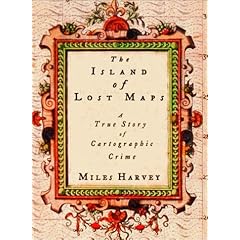
Chances are, most of the people who read my reviews are collectors of one shade or another. But I expect few of my readers are as nuts about crazily-expensive old maps as the dealers and buyers who make up the cast of this fascinating little story. It's a tale of true crime where the victims are fragile, ancient indices in the rare books departments of large libraries, and the criminal who vandalizes them is Bland by name, bland by nature, and vulgar in deed.
The story starts in Baltimore, 1995. While millions of us were thrilling to the fictional Homicide: Life on the Street on NBC, real-world cops in the city had picked up a man who'd been taking razor blades to books in the Peabody, silently stealing ancient maps to resell from his Florida-based antique business. Gilbert Bland had multiple identities, the trust of a growing circle of traders and property pilfered from quite a few universities and private collections before he finally made a mistake and was caught... but that was just the beginning of the story.
To be honest, the story itself was fascinating, but I was occasionally disappointed with the carefree way that Miles Harvey told it. I found a very good 2002 review of this book by Richard Strassberg (available here) which I found very much in line with my thoughts. Harvey personalizes his narrative too much; his research, interviews and groundwork should have given us a more objective, fact-based story, and let the curious characters he meets, like the ostentatious millionaire Graham Arader, provide the color. But Harvey allows himself far too much intrusion into other peoples' stories, resulting in tacky inventions, narrative fiction and navel-gazing psychoanalysis unsuited to the tale.
In all, it's a fine story, and I believe that anybody curious about incunabula or capers will find much to enjoy in it, but readers will also tire quickly of the way Harvey tells the story. George Peabody's ghost really has no place in a work like this. I have to recommend the book with reservations; the original article from Outside (available here) tells the story in a far more succinct and entertaining way than this book.
No comments:
Post a Comment